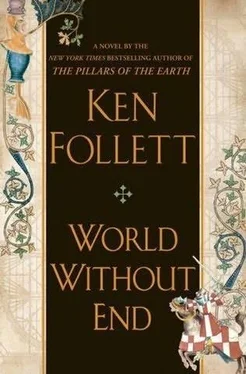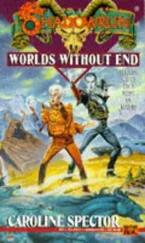She often spoke like this, giving a little sermon in answer to a simple question. Her manner was supercilious, as always, but Papa did not mind, or pretended not to. “My remarkable sister,” he said. “You’re the one who inherited our father’s wisdom.”
Petranilla turned to the girls. “Our father was descended from Tom Builder, the stepfather and mentor of Jack Builder, architect of Kingsbridge Cathedral,” she said. “Father vowed to give his firstborn to God but, unfortunately, his firstborn was a girl – me. He named me after St Petranilla – who was the daughter of St Peter, as I’m sure you know – and he prayed for a boy next time. But his first son was born deformed, and he did not want to give God a flawed gift, so he brought Edmund up to take over the wool business. Happily, his third child was our brother Anthony, a well-behaved and God-fearing child, who entered the monastery as a boy and is now, we are all proud to say, the prior.”
She would have become a priest, had she been a man, but as it was she had done the next best thing and brought up her son, Godwyn, to be a monk at the priory. Like Grandfather Wooler, she had given a child to God. Caris had always felt sorry for Godwyn, her older cousin, for having Petranilla as a mother.
Petranilla noticed the red coat. “Whose is this?” she said. “It’s the most expensive Italian cloth!”
“I bought it for Rose,” said Papa.
Petranilla stared at him for a moment. Caris could tell she thought he was a fool to buy such a coat for a woman who had not left the house for a year. But all she said was: “You’re very good to her,” which might have been a compliment or not.
Father did not care. “Go up and see her,” he urged. “You’ll cheer her up.”
Caris doubted that, but Petranilla suffered no such misgivings, and she went up the stairs.
Caris’s sister, Alice, came in from the street. She was eleven, a year older than Caris. She stared at Gwenda and said: “Who’s she?”
“My new friend Gwenda,” said Caris. “She’s going to take a puppy.”
“But she’s got the one I wanted!” Alice protested.
She had not said that before. “Ooh – you never picked one!” Caris said, outraged. “You’re just saying that to be mean.”
“Why should she have one of our puppies?”
Papa intervened. “Now, now,” he said. “We’ve got more puppies than we need.”
“Caris should have asked me which one I wanted first!”
“Yes, she should,” Papa said, even though he knew perfectly well that Alice was only making trouble. “Don’t do it again, Caris.”
“Yes, Papa.”
The cook came in from the kitchen with jugs and cups. When Caris was learning to talk she had called the cook Tutty, no one knew why, but the name had stuck. Papa said: “Thank you, Tutty. Sit at the table, girls.” Gwenda hesitated, not sure if she was invited, but Caris nodded at her, knowing that Papa intended her to be included – he generally asked everyone within his range of vision to come to dinner.
Tutty refilled Papa’s cup with ale, then gave Alice, Caris and Gwenda ale mixed with water. Gwenda drank all of hers immediately, with relish, and Caris guessed she did not often get ale: poor people drank cider made from crab apples.
Next, the cook put in front of each of them a thick slice of rye bread a foot square. Gwenda picked hers up to eat it, and Caris realized she had never dined at a table before. “Wait,” she said quietly, and Gwenda put the bread down again. Tutty brought in the ham on a board and a dish of cabbage. Papa took a big knife and cut slices off the ham, piling it on their bread trenchers. Gwenda stared big-eyed at the quantity of meat she was given. Caris spooned cabbage leaves on top of the ham.
The chambermaid, Elaine, came hurrying down the stairs. “The mistress seems worse,” she said. “Mistress Petranilla says we should send for Mother Cecilia.”
“Then run to the priory and beg her to come,” Papa said.
The maid hurried off.
“Eat up, children,” said Papa, and he speared a slice of hot ham with his knife; but Caris could see that the dinner now had no relish for him, and he seemed to be looking at something far away.
Gwenda ate some cabbage and whispered: “This is food from heaven.” Caris tried it. The cabbage was cooked with ginger. Gwenda had probably never tasted ginger: only rich people could afford it.
Petranilla came down, put some ham on a wooden platter, and took it up for Mama; but she came back a few moments later with the food untouched. She sat at the table to eat it herself, and the cook brought her a bread trencher. “When I was a girl, we were the only family in Kingsbridge who had meat for dinner every day,” she said. “Except on fast days – my father was very devout. He was the first wool merchant in town to deal directly with the Italians. Everyone does now – although my brother Edmund is still the most important.”
Caris had lost her appetite, and she had to chew for a long time before she could swallow. At last Mother Cecilia arrived, a small, vital woman with a reassuringly bossy manner. With her was Sister Juliana, a simple person with a warm heart. Caris felt better as she watched them climb the stairs, a chirpy sparrow with a hen waddling behind. They would wash Mama in rose water to cool her fever, and the fragrance would lift her spirits.
Tutty brought in apples and cheese. Papa peeled an apple absent-mindedly with his knife. Caris remembered how, when she was younger, he used to feed her peeled slices then eat the skin himself.
Sister Juliana came downstairs, a worried look on her podgy face. “The prioress wants Brother Joseph to come and see Mistress Rose,” she said. Joseph was the senior physician at the monastery: he had trained with the masters at Oxford. “I’ll just go and fetch him,” Juliana said, and she ran out through the door to the street.
Papa put his peeled apple down uneaten.
Caris said: “What is going to happen?”
“I don’t know, buttercup. Will it rain? How many sacks of wool do the Florentines need? Will the sheep catch a murrain? Is the baby a girl, or a boy with a twisted leg? We never know, do we? That’s…” He looked away. “That’s what makes it so hard.”
He gave her the apple. Caris gave it to Gwenda, who ate it entire, core and pips too.
Brother Joseph arrived a few minutes later with a young assistant whom Caris recognized as Saul Whitehead, so called because his hair – what little he had left after his monkish haircut – was ash-blond.
Cecilia and Juliana came downstairs, no doubt to make room for the two men in the small bedroom. Cecilia sat at the table, but did not eat. She had a small face with sharp features: a little pointed nose, bright eyes, a chin like the prow of a boat. She looked with curiosity at Gwenda. “Well, now,” she said brightly, “who is this little girl, and does she love Jesus and His Holy Mother?”
Gwenda said: “I’m Gwenda, I’m Caris’s friend.” She looked anxiously at Caris, as if she feared it might have been presumptuous of her to claim friendship.
Caris said: “Will the Virgin Mary make my mama better?”
Cecilia raised her eyebrows. “Such a direct question. I could have guessed you’re Edmund’s daughter.”
“Everyone prays to her, but not everyone gets well,” Caris said.
“And do you know why that is?”
“Perhaps she never helps anyone, and it’s just that the strong people get well and the weak don’t.”
“Now, now, don’t be silly,” said Papa. “Everyone knows the Holy Mother helps us.”
“That’s all right,” Cecilia told him. “It’s normal for children to ask questions – especially the bright ones. Caris, the saints are always powerful, but some prayers are more effective than others. Do you understand that?”
Читать дальше












